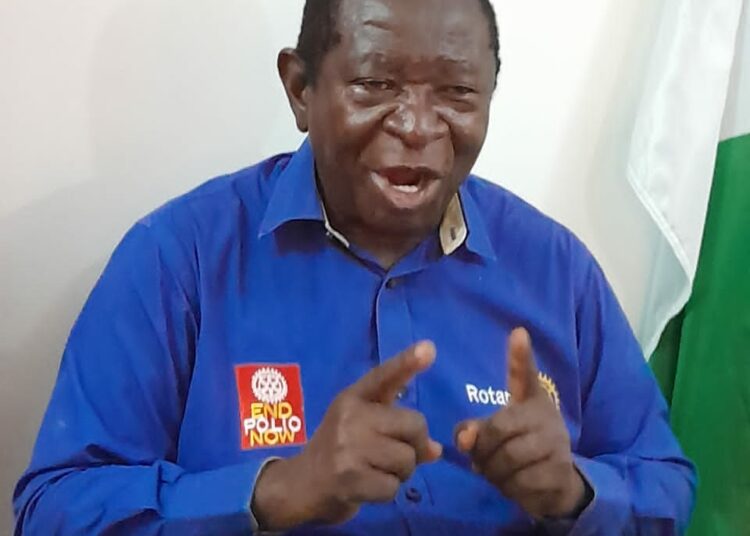Joshua Hassan is the National Chairman Of Nigeria National Polio Plus Committee (NNPPC), in this interview with selected journalists, which IGHO OYOYO was there, spoke on the forthcoming National Polio Day, with assurance that the World Health Organisation (WHO) and other partners have targeted 2026 as a year to end polio globally. Excerpts…
What is the World Polio Day all about?
October 24 is a very important day in the calendar of Polio eradication. It is a day for us to raise awareness of our resources in Rotary and our partners and for the worldwide efforts to eradicate polio. It has not been easy. In 1988 we started with 350 cases, almost daily in the whole world. So, this year October is World Polio Day to raise awareness of the importance of vaccination to protect every child from devastating diseases, and we normally give this vaccine to children from 5 and below. We want to celebrate the many parents whose children were vaccinated, our partners and volunteers. We have over 100, 000 volunteers around the world any time we go out for vaccination. So, World Polio Day is a time for Rotarians, public health advocates, and everyone who wants a free polio world. It is a day also for advocacy to the government, to traditional rulers, and to everything that you think can make a difference. So, the day is commemorated every year because of the person who found the vaccine.
We have exited the polio epidemic as a nation. How has the journey been?
To exit, they must not find any polio in the country for a minimum of three years. There are two partners we work with; WHO and UNICEF. Earlier on, the country was free for two and a half years. We were just planning for the celebration when the issue came out in 2017 in Borno. The state was locked up with no access. In 2017 we had to start another three years. So by early 2020, Nigeria was declared free, but we didn’t get the certificate until August 2020. By Nigeria being declared free, Africa too became free of the wild poliovirus. So, even the countries battling with it now, it is at the end of when they got the last polio case, three years will be counted and if no polio case is detected, they can be declared free.
How much has been spent on it?
Spending is very difficult to judge because everybody is spending. Rotary is spending. WHO is spending. UNICEF is spending. Dangote is spending. Bill and Melinda Gates are spending, many people are spending. Also, people spend in kind, not cash; the traditional rulers, the churches, and the mosques. We are spending for the good health of our children. This is what we do. We are not in competition with each other, but on the same page trying to achieve the same thing.
Can we say we are no longer experiencing polio strains?
We are, there is what is called vaccine-derived polio virus. In areas where children were not adequately vaccinated or not vaccinated at all vaccines proliferate. They go on the ground and over time, they mutate and then this thing is man to man. And the children can pick it up on the ground. So we are still suffering from the vaccine. As of now, there is one called AIT. They do not deal with states anymore. They say consequential geography. AIT is an acronym for Axis of Interacted Transmission States. The key states we are dealing with now are Sokoto, Zamfara, Kebbi, and Katsina. They are challenged with AIT. Very very serious. As of now in Africa, Nigeria is leading. And in Nigeria, the Northern part is on top, and in Northern Nigeria, the above states are affected.
What is your committee doing to ensure that these four states are covered?
We are not doing it alone. We work with our partners. Everybody is on the field. We act immediately when cases are reported. Every year, we go to the States and award the foot soldiers; those who do the work. This is just to encourage others to work. Every year, now we are going to make it every quarter, we go to states and we award the foot soldiers, best town criers, best vaccinators, best record people, and others. Now the National Primary Healthcare said we should award the best local organisation officer, just to encourage others.
What are the challenges in the region?
Insecurity and accessibility. In Kaduna and Zamafara, kidnappers abducted and killed some people. So banditry and kidnappers are affecting our operations. A team arrived last Sunday. They called themselves Outbreak Response Assessment groups. They come from all the partners worldwide; about 37 of them. They have gone to all the states. They split themselves into states to see what is going on and see how they can help technically. That is why the national polio coordinator is in Katsina. So, it exists and that is what we’re battling with.
Is insecurity affecting surveys or immunization?
It is affecting both. How can you survey where there is insecurity? In some places when I reach I can not afford to go with my phone. If they see you with a telephone, you are in trouble. But there is nothing we do not do to get every child reached and vaccinated.
How many countries have the wild poliovirus?
Only two countries have it; Afghanistan and Pakistan. I got from WHO and Rotary International weekly reports. This past Friday, they said that the total number of wild polio cases in 2023. That is from January to October 11 is nine; three in Pakistan, and six in Afghanistan. Last year, the same period, they had 30 cases. There is improvement.
So, there is no polio threat?
Yes, but there is the vaccine-derived polio
What is the solution?
Immunization is the solution
What has been the response of Nigerians?
Very great. We are lucky. Last month, we did one in the south-south and southeast because one variant was found in Enugu. In Nigeria, you can’t get 100%. In some cases doctors reject vaccines. I went to Niger State two years ago and discovered that it is only the state that has passed a law that says any child that needs vaccination, medicine, or anything should be given.
Is it possible to completely eradicate polio considering insecurity mitigating against your operations?
Yes, it is possible to eradicate polio, but only by vaccines. Once we eradicate it, every child will be clean and the environment will be good. There is nothing more to talk about. All we are fighting is let us eradicate polio and the money we are putting here will now fund another thing. We have done 99 percent, it is just one percent remaining.
Is there a targeted period for this to be achieved?
As of now, we have one we called 2022 to 2026. We are hoping that by the end of December in that axis, we should have tame it so that we do not to 2024 to 2026. By then, it should have calmed down drastically. We are hoping that by the end of this year, we will have minimum cases. Then we will be doing routine immunizations. The target globally is 2026. We are hoping that by the end of December 2026, polio will be completely eradicated.
Based on the effort you have put in place, would you advocate that there should be a national law regarding that?
Any person in his normal mind would make good laws for children because they are the future of the country. We have suffered enough from diseases. Ignorance, bad lifestyle, and beliefs in our culture are affecting us. I have gone to churches where they say they do not believe in taking medicine, they just pray and the sickness will go. I know of a sister, a trained nurse who died. What I tell people is, to do the best you can.











